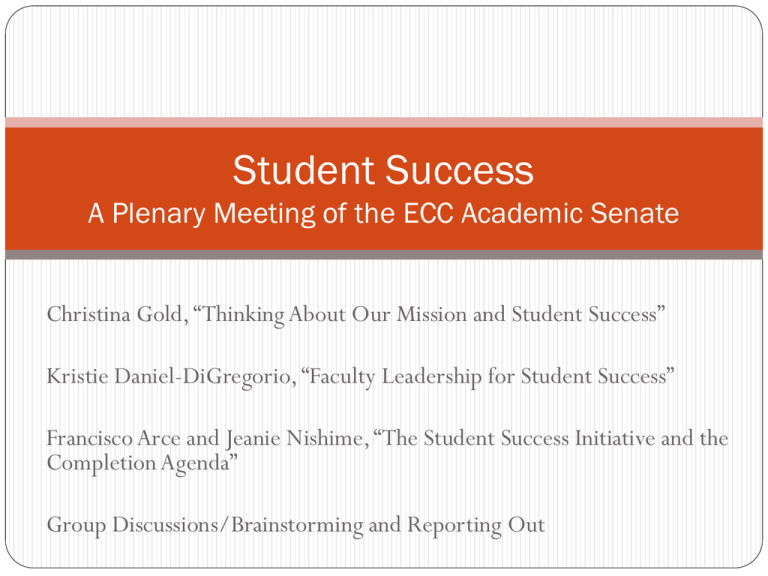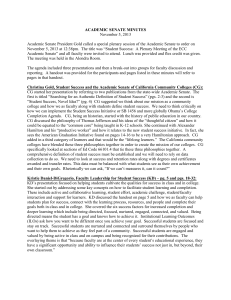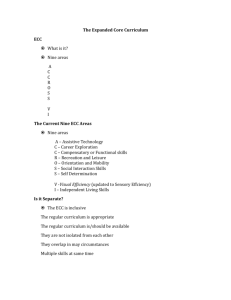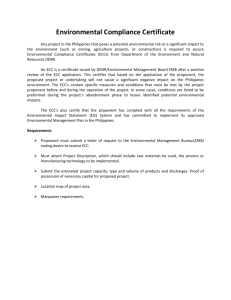Student Success A Plenary Meeting of the ECC Academic Senate
advertisement

Student Success A Plenary Meeting of the ECC Academic Senate Christina Gold, “Thinking About Our Mission and Student Success” Kristie Daniel-DiGregorio, “Faculty Leadership for Student Success” Francisco Arce and Jeanie Nishime, “The Student Success Initiative and the Completion Agenda” Group Discussions/Brainstorming and Reporting Out The Purpose of Public Education Thomas Jefferson •Democratization •Public education for upper and lower classes to create thoughtful citizens. •Common Core (?) Alexander Hamilton •Political power held by elites •Public education for the upper •Lifelong learning – 1960s class to create thoughtful citizens and 1970s •Public education for the lower classes to create productive workforce to fuel the US economy •American Graduation Initiative Mission of the California Community Colleges California Education Code 66010.4 Thoughtful citizen. Productive Worker Lifelong Learner The California Community Colleges shall, as a primary mission, offer academic and vocational instruction at the lower division level for both younger and older students … [and] may grant the associate in arts and the associate in science degree. [This includes] •The provision of remedial instruction for those in need of it… •The provision of adult noncredit education curricula… •The provision of community services courses and programs… A primary mission of the California Community Colleges is to advance California’s economic growth and global competitiveness through education, training, and services that contribute to continuous workforce improvement. Faculty Leadership for Student Success Helping students cultivate the qualities for success in class and in college. Facilitating Student Learning and Completion Active and collaborative learning. Student effort. Academic challenge. Student-faculty interaction. Support for learners. Faculty Leadership “Moving the needle on student outcomes of community colleges substantially depends on what happens in the classroom.” The Heart of Student Success:Teaching, Learning, and College Completion” Kay McClenney “Students most commonly recognized faculty as having the greatest potential impact on their educational journeys.” Student Support (Re)defined:What Students Say They Need to Succeed “…faculty have always thought about and planned for student success. In fact, student success is the core guiding principle of our work.” Student Success, Novel Idea? Chiabotti, D. Conditions for Increased Completion & Deeper Learning Six Success Factors: Directed Focused Nurtured Engaged Connected Valued Student Support (Re)defined:What Students Say They Need to Succeed, The Research & Planning Group for CA Community Colleges. www.rpgroup.org Successful Students are DIRECTED They have a goal and know how to achieve it. In my class: In college: Model/assist students in Guide students to resources setting and achieving shortand long-term goals, including learning goals for the course. Better than “passing:” encourage students to expect more of themselves, set high expectations. How does doing well benefit them? that help them develop sense of direction. Help students understand and appreciate connections between majors and careers; between college completion and opportunity. Successful Students are FOCUSED Students stay on track. In my class: Be explicit about impact of attendance and time on task on success. “Am I passing?” Help students take ownership for monitoring their progress in class. Help students see and provide opportunities to reflect on their choices and the resulting outcomes & experiences. In college: Discuss completion and encourage students to monitor their progress every semester. Highlight importance of GPA & of passing the first time: making sacrifices, impact of short-term choices on longterm goals. Direct students to financial resources. Successful Students are NURTURED & CONNECTED Others want/help them succeed; they feel part of community. In my class: In college: Encourage student-to-student Assist in networking with relevant clubs, leadership support. opportunities. Model interdependence: Encourage students to spend make personal connections time on campus, allowing with colleagues to facilitate time to forge connections. student referrals. Break down barriers to seeking help from instructors, campus supports. Successful Students are ENGAGED & VALUED Active in class and on campus; contributions are recognized. In my class: Active learning: Students shift from passive recipients to full partners in learning. Student-student interaction: Facilitate collaborative learning in/outside class. Student-faculty interaction: Communicate value for individual student, student understanding, feedback, office hours. In college: Emphasize importance of building support network on campus. Recognize students’ strengths, accomplishments and involvement on campus. Faculty Leadership for Student Success “…because faculty are at the center of every student’s educational experience, they have a significant opportunity and ability to influence their students’ success not just in, but beyond, their own classroom.” Student Support (Re)defined:What Students Say They Need to Succeed. Student Success & Support Program (SB1456) and the College Completion Agenda Student Success Act of 2012 Senate Bill 1456 signed into law September 2012 SB 1456 re-names the Matriculation program as the Student Success and Support Program (SSSP). Targets funding to core services of orientation, assessment, counseling/advising to assist students with development of education plans Focuses on helping new students define goals and get on track to achievement Key Provisions to Incentivize and Support Goal Completion Mandates assessment, orientation, and education planning Requires students to declare a course of study Sets minimum academic standards for state financial aid Establishes Student Success Scorecard at all colleges Student Success & Support Programs Fall 2014 – registration priority given to new students who complete assessment, orientation, and educational planning Fall 2014 – registration priority lost for students on 2nd semester probation or who earn 100+ units Fall 2015 – Board of Governor Fee Waiver (BOGFW) students must meet academic and progress requirements to receive a waiver of their enrollment fees Fall 2015 – all new students must complete assessment, orientation, and educational planning to enroll; continuing students with 15+ units must declare a program of study and complete an educational plan Coming Events…. Statewide common assessment Required completion of basic skills remediation within the first year Required declaration of a career goal as well as a major Adult education transferred to community colleges in partnership with K-12 Increasing emphasis on completion of certificate, degree, or transfer The College Completion Challenge Only half of all undergraduates complete a college degree in six years. 38% of all U.S. students take a remedial course in their first or second year. More than 60% of jobs will require a postsecondary education. Students with a bachelor’s degree will earn 40% more in their lifetime (29% more with a community college degree) than students with only high school diplomas. The U.S. is 9th in the world in college attainment for the 25-34 year old population. Education Requirements for Jobs, 2018 20 Georgetown University, Center on Education and the Workforce, 2010 p. 14 http://www9.georgetown.edu/grad/gppi/hpi/cew/pdfs/FullReport.pdf ECC and CEC Certificates and Degrees Awarded 2500 Certificates Degrees 2000 1500 1000 500 0 2008-2009 2009-2010 2010-2011 2011-2012 2012-2013 2008-2009 2009-2010 2010-2011 COM Campus ECC COM 2011-2012 2012-2013 ECC Award Type 2008-09 2009-10 2010-11 2011-12 2012-13 1-yr change (%) Degrees 1,137 1,303 1,399 1,686 2,012 19% Certificates 442 403 414 489 592 21% Degrees 150 157 211 230 281 22% Certificates 27 78 51 102 96 -6% ECC and CEC Transfer Rates 1000 CalState 900 Out of State 800 Private 700 UC 600 500 400 300 200 100 0 2007-2008 2008-2009 2009-2010 2010-2011 2011-2012 2007-2008 2008-2009 2009-2010 COM 2010-2011 2011-2012 ECC Campus Transfer Type 2007-08 2008-09 2009-10 2010-11 2011-12 1-yr change (%) ECC ECC ECC UC CalState Private Out of State UC CalState Private Out of State 186 644 122 89 8 79 11 30 272 749 115 130 11 88 9 42 274 719 163 168 27 133 30 54 307 769 153 175 63 227 43 71 252 930 125 153 55 326 38 44 -18% 21% -18% -13% -13% 44% -12% -38% ECC COM COM COM COM Discussion Partnering for Student Success and Goal Completion We Need Your Input How do you define student success? What do students need to do to improve student success? What do faculty need to do to improve student success?



